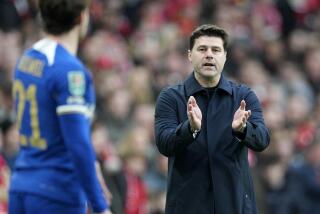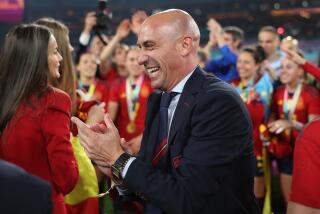Bitter Campaign Ends With Blatter as FIFA President
- Share via
PARIS — Sepp Blatter, the man with the name that sounds like the inside of a German soccer ball, became the most powerful man in international soccer Monday when he was named president of FIFA, succeeding the retiring Joao Havelange.
Blatter, 62, was elected virtually by default after he and European soccer union president Lennart Johansson failed to garner enough votes on the first ballot and Johansson withdrew before the second ballot, leaving Blatter as the only remaining candidate.
Blatter’s victory is seen as a triumph for Havelange, a longtime rival of Johansson. Havelange did not want to see the mantle of FIFA president passed to Johansson, so two months ago, he persuaded longtime aide Blatter to enter the race.
Havelange publicly and aggressively campaigned for Blatter, rallying allies within FIFA to do the same. Michel Platini, head of the France 98 World Cup organizing committee, was among those enlisted by Havelange to throw their support behind Blatter’s candidacy.
Name-calling and personal attacks were prominent during the campaign. Johansson accused Blatter of stealing his platform and acting as a straw man for Havelange; Blatter said that Johansson was a puppet of the German soccer federation and Antonio Matarese, the powerful head of the Italian federation who probably would take over at UEFA if the Swede was elected FIFA president.
The bitter campaign was also expensive. According to reported estimates, the candidates spent more than $1 million combined.
“The game is over,” said Johansson, after Blatter outpolled him, 111-80, on the first ballot, when a two-thirds vote was needed for victory. “I wish Mr. Blatter luck.”
Born Joseph Blatter on March 10, 1936, in Visp, Switzerland, Blatter played soccer and earned degrees in business and economics at the University of Lausanne before beginning his career in sports administration as general secretary of the Swiss Ice Hockey Federation.
He joined FIFA as director of technical development programs in 1975 and six years later was appointed secretary general, a position he held for the last 17 years.
Blatter briefly considered running against Havelange in 1994 when Havelange bid for a sixth term as FIFA president, but eventually scrapped the idea. Instead, Havelange was reelected by acclamation and together, he and Blatter cleaned house of staffers deemed disloyal during the campaign or potential threats.
Four years later, Havelange rewarded Blatter for his loyalty by helping deliver him the presidency.
Blatter, like his predecessor, is a controversial figure in world soccer. He has proposed sometimes radical changes in the sport, prompting one critic to write, “Sepp Blatter had 50 ideas every day, and 51 of them are bad.”
Blatter said last week, “They’ve called me a dictator, a despot. They want Blatter out. But I do not do this for personal ambition. I do it as someone who cares for sport.”
The victory also could benefit U.S. soccer. Blatter was very impressed by the last World Cup, held in the United States four years ago, and one of his chief supporters was Alan Rothenberg, president of the U.S. Soccer federation.
*
France Football, a publication that’s regarded by the French as the bible of soccer, doesn’t have a high regard for the U.S. team.
In rating each of the 32 teams, France Football gave the United States only two stars on a scale of six. Despite the enthusiasm generated by the 1994 World Cup team’s advance to the second round and the national team’s advance to the semifinals of the Copa Americana in 1995 and the Gold Cup this year, the U.S. team isn’t at the same level as Germany and Yugoslavia, two of its Group F rivals.
The only team to get the maximum six stars was defending champion Brazil. Italy got five, as did Germany, Argentina and England. The French team got only four.
At the bottom, with one star each, were South Africa, Saudi Arabia, Paraguay, South Korea, Iran, Tunisia, Japan and Jamaica.
*
French midfielder Zinedine Zidane and defender Lilian Thuram sustained minor injuries in a warmup game against Finland last week but both are expected to play against South Africa on Friday.
*
Times staff writer Helene Elliott and the Associated Press contributed to this story.
More to Read
Go beyond the scoreboard
Get the latest on L.A.'s teams in the daily Sports Report newsletter.
You may occasionally receive promotional content from the Los Angeles Times.






